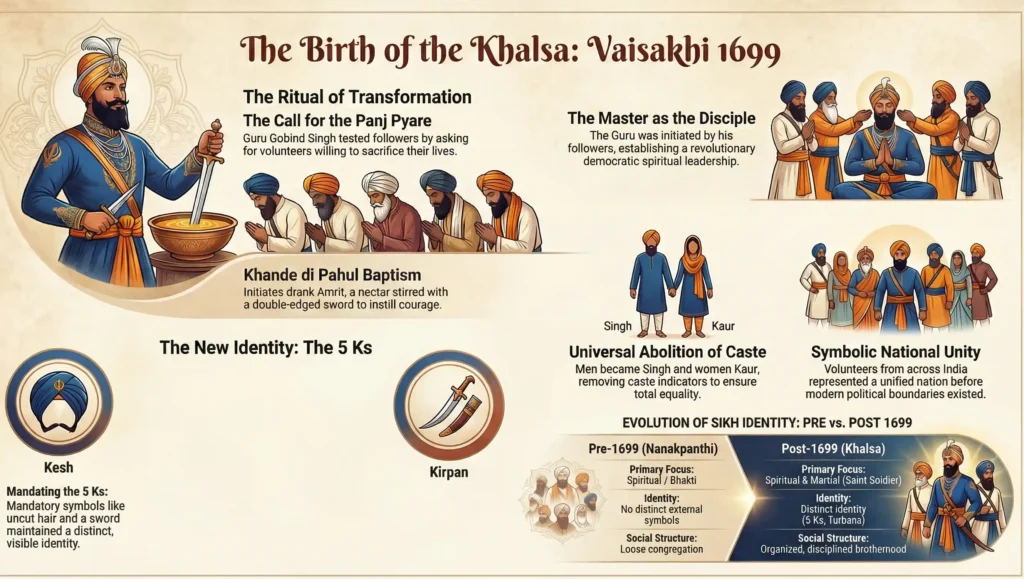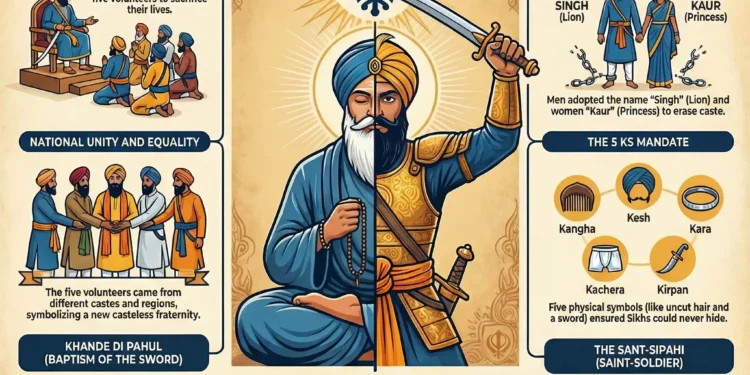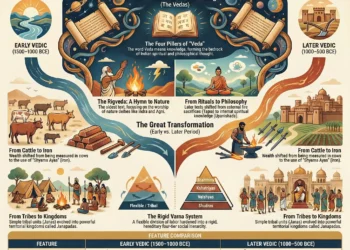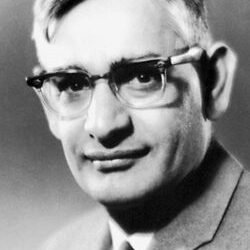The Foundation of the Khalsa took place on March 30, 1699 (Vaisakhi), at Anandpur Sahib in Punjab. It was orchestrated by the tenth Sikh Guru, Guru Gobind Singh, in response to the severe persecution of Sikhs under the Mughal Emperor Aurangzeb and the corruption of the internal Masand system. In a dramatic congregation, the Guru asked for five volunteers willing to sacrifice their heads for their faith. These five men, coming from different castes and regions, became the Panj Pyare (Five Beloved Ones). They were initiated through a new baptism ceremony called Khande di Pahul (Baptism of the Sword), creating a new casteless fraternity of "Saint-Soldiers" known as the Khalsa (The Pure). This event gave Sikhs a distinct identity with the 5 Ks and the names "Singh" (Lion) for men and "Kaur" (Princess) for women.| Feature | Details |
| Date | March 30, 1699 (Vaisakhi) |
| Location | Anandpur Sahib, Punjab |
| Founder | Guru Gobind Singh (10th Guru) |
| Core Group | Panj Pyare (Five Beloved Ones) |
| Ceremony | Khande di Pahul (Amrit Sanskar) |
| New Titles | Singh (Lion) for Men; Kaur (Princess) for Women |
| Key Symbols | The 5 Ks (Kesh, Kangha, Kara, Kachera, Kirpan) |
| Objective | To create a casteless order of Saint-Soldiers (Sant-Sipahi) |
The Crisis of Faith and Freedom

By the late 17th century, the political climate in North India was volatile. The Mughal Emperor Aurangzeb had executed the ninth Sikh Guru, Guru Tegh Bahadur, in 1675 for defending the rights of Kashmiri Pandits. The Sikhs were being hunted, and their distinct identity was under threat.
Simultaneously, the internal structure of Sikhism was rotting. The Masands (regional deputies appointed to collect tithes) had become corrupt and powerful, often acting against the Guru’s wishes. Guru Gobind Singh, seeing the external threat and internal decay, decided that a radical transformation was needed. He wanted to create a community that was not just spiritually pure but also physically capable of defending itself—a brotherhood that feared no one but God.
Annexation of Punjab 1849: The Fall of the Sikh Empire
The Call at Anandpur Sahib
On the harvest festival of Vaisakhi in 1699, Guru Gobind Singh summoned a massive congregation at Anandpur Sahib. Historical accounts suggest tens of thousands gathered.
Suddenly, the Guru appeared on stage with a naked sword in his hand. The crowd went silent. He asked a chilling question: “Is there any true Sikh of mine who is ready to die for his Dharma? If there is, let him come forward and offer his head to me.”
A deep fear gripped the audience. Many slipped away. Finally, a shopkeeper from Lahore named Daya Ram stood up and offered his head. The Guru took him into a tent. A thud was heard, and the Guru returned with a bloodied sword. He asked for another head.
This happened four more times. Each time, a volunteer stepped forward, was taken into the tent, and the Guru returned with a bloody sword.
The Resurrection: The Panj Pyare
After the fifth volunteer went in, the tent flap opened. To the amazement of the crowd, all five men walked out alive, dressed in new saffron robes and turbans. The Guru revealed that he had slaughtered goats to test their faith (though some traditions believe it was a divine miracle).
These five men were named the Panj Pyare (The Five Beloved Ones):
- Daya Ram (Shopkeeper from Lahore) – became Bhai Daya Singh
- Dharam Das (Farmer from Hastinapur) – became Bhai Dharam Singh
- Himmat Rai (Water-carrier from Odisha) – became Bhai Himmat Singh
- Mohkam Chand (Tailor from Dwarka) – became Bhai Mohkam Singh
- Sahib Chand (Barber from Bidar) – became Bhai Sahib Singh
Notice the diversity: they came from different castes (high and low) and different corners of India, symbolizing national unity and social equality.
The Baptism of the Sword
The Guru then performed the Khande di Pahul ceremony. He stirred water and sugar crystals (Patashas, added by his wife Mata Sahib Kaur) in an iron bowl with a double-edged sword (Khanda) while reciting Gurbani. This nectar, called Amrit, was given to the Panj Pyare.
In a move that stunned history, Guru Gobind Singh then knelt before the Panj Pyare and asked them to initiate him into the Khalsa. He became the sixth member, transforming from Gobind Rai to Guru Gobind Singh. This established the democratic principle: “Waho Waho Gobind Singh, Aape Gur Chela” (Hail Gobind Singh, who is himself the Master and the Disciple).
Third Battle of Panipat 1761: The Day the Maratha Dream Died
The 5 Ks: Symbols of Identity
To ensure that a Sikh could never hide his identity in the face of danger, the Guru mandated the 5 Ks (Panj Kakaar):
- Kesh: Uncut hair, symbolizing acceptance of God’s will and saintliness.
- Kangha: A wooden comb to keep the hair clean, symbolizing discipline.
- Kara: An iron bracelet, a reminder of the bond with the Guru and self-restraint.
- Kachera: Cotton undergarments, symbolizing chastity and readiness for battle.
- Kirpan: A sword to defend the weak and fight injustice, not for oppression.
Breaking the Chains of Caste
The Khalsa was a social revolution. The Guru abolished the caste system among the Khalsa. All men were given the surname Singh (Lion) and all women Kaur (Princess/Lioness), removing the caste indicators from their names. They were to drink Amrit from the same bowl, shattering the taboos of untouchability. The Khalsa was to be a casteless brotherhood where the lowest laborer was equal to the highest king.
Death of Tipu Sultan: The Fall of the Tiger of Mysore
Quick Comparison Table: Pre-Khalsa vs. Post-Khalsa Sikhism
| Feature | Pre-1699 (Nanakpanthi) | Post-1699 (Khalsa) |
| Primary Focus | Spiritual / Bhakti | Spiritual & Martial (Saint-Soldier) |
| Identity | No distinct external symbols | Distinct identity (5 Ks, Turbans) |
| Leadership | Human Guru | Guru Granth Sahib & Panj Pyare |
| Names | Traditional/Caste names | Singh and Kaur |
| Social Structure | Loose congregation | Organized, disciplined brotherhood |
Curious Indian: Fast Facts
- The Sugar: It is said that when the Guru was stirring the water with his sword, Mata Sahib Kaur rushed in and added sugar crystals. The Guru remarked that this ensured his soldiers would be brave but also have sweetness in their hearts. Mata Sahib Kaur is thus known as the “Mother of the Khalsa.”
- The Masands: One of the first acts of the Khalsa was to abolish the corrupt Masand system. The Guru punished the corrupt deputies and established a direct link with his disciples.
- The Nash Doctrine: The Khalsa were asked to renounce their previous lineage (Kul Nash), previous religion (Dharam Nash), and previous occupation-based shame (Krit Nash), effectively being reborn.
- Geographic Spread: The Panj Pyare came from Lahore (North), Hastinapur (Center), Dwarka (West), Odisha (East), and Bidar (South), effectively representing the map of India long before modern nationalism.
Conclusion
The Foundation of the Khalsa was the pivotal moment when the Sikh community transformed from passive devotees into active defenders of justice. It institutionalized courage. By creating a casteless order of warriors who refused to bow to tyranny, Guru Gobind Singh didn’t just save Sikhism; he created a force that would eventually cripple the Mughal Empire and stop the Afghan invasions. The spirit of Vaisakhi 1699 lives on every time a Sikh stands up against injustice.
Indian Rebellion of 1857: The First War of Independence
If you think you have remembered everything about this topic take this QUIZ
When was the Khalsa Panth founded?
It was founded on March 30, 1699 (Vaisakhi day).
Who were the Panj Pyare?
They were the first five Sikhs initiated into the Khalsa: Bhai Daya Singh, Bhai Dharam Singh, Bhai Himmat Singh, Bhai Mohkam Singh, and Bhai Sahib Singh.
What are the 5 Ks of the Khalsa?
They are Kesh (uncut hair), Kangha (comb), Kara (iron bracelet), Kachera (shorts), and Kirpan (sword).
Who is considered the Mother of the Khalsa?
Mata Sahib Kaur is considered the Mother of the Khalsa for her role in adding sweetness to the Amrit.
What does the word “Khalsa” mean?
Khalsa comes from the Arabic/Persian word Khalis, meaning “Pure” or “belonging directly to the King.”




